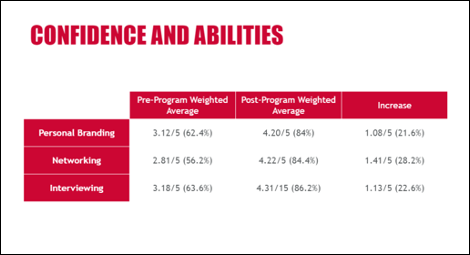Canadians are getting vaccinated and the Canadian economy is responding. As it reopens and incrementally improves, employers are beginning to hire and regrow their talent pools. So, too, are university students assessing the job market – and the challenges they may face – as they prepare to look for work.
The Career Management Centre (CMC) at Simon Fraser University’s (SFU) Beedie School of Business wanted to better understand the experiences of its graduates to identify opportunities to support them in their transition to post-graduate work. Based on graduates’ responses to Beedie’s 2020 Employment Outcome Survey, we realized a career program designed for exiting students was key to graduates’ successful job search during the pandemic. In response, as a Career Advisor at the CMC, I designed and facilitated Career Launch, an eight-week, 16-session intensive career preparation program focusing on skill development in personal branding, networking and interviewing in a virtual environment. Here’s how we built it and what we learned.
Forging forward, despite COVID-19 setbacks
Undergraduate students across all institutions have identified job search setbacks due to COVID-19, including increased competition in the labour market, organizational restructuring and a growing number of employers relying on online technologies, such as LinkedIn, to source talent. The expectations placed on students to pivot and reframe their job search process to address this new climate can be overwhelming and discouraging. Career Launch not only provides resources and strategies, but also mentorship to reinstate confidence and ability for a virtual job search.
This voluntary and fully virtual program was piloted for students in SFU’s business school, and required students to have good academic standing and be in their senior years of study. It begins with students undertaking a self-assessment, to gain a deeper understanding of themselves from their lived experiences (values, accomplishments, skills) and prepare them for conversations with others about work and life choices. Students then create individualized personal branding statements that reflect their assessment at the end of their academic journey and progression into early career. We invite industry guests to provide feedback on participants’ statements and also train students in virtual branding.
“The expectations placed on students to pivot and reframe their job search process to address this new climate can be overwhelming and discouraging.”
Students participate in virtual workshops on virtual networking and informational interviewing in both group and 1:1 environments. This culminates in mock interview practice, and the program concludes with a recent alumni panel discussing job search strategies and tips. Students reflect on all components in a capstone project that includes a 30-60-90-day job search plan, their most up-to-date personal branding statement, key networking contacts with whom they may correspond, STAR (situation, task, action, and result) interview statements tailored to a desired job posting and preferred industries of choice to research further.
How did Career Launch fare?
Career Launch approaches the job search process from the point of view of the graduating student, who is seeking self-awareness and a professional image as a soon-to-be graduate. At the beginning of the pilot program in February 2021, 13 student participants were asked to complete a pre-program survey, where they identified varied confidence in their personal branding, networking and interview skills as soon-to-be graduates. These same students were surveyed during and after the program, revealing in a marked increase in confidence and abilities in core areas of personal banding, networking and interviewing (as identified in the graphic below).
Two student cohorts with a total of 25 participants have now completed Career Launch. Within the first cohort, half of the students successfully secured co-op positions, internships and full-time employment immediately following the program. They acquired work in the fields of digital marketing, human resources, digital product information and settlement outreach. We are still waiting on survey data from the second cohort, which finished at the end of July 2021.
Participants’ own testimonials also showcase the value of an interactive virtual learning module, for post-graduation job search success:
“The program takes things I already know about myself (i.e. hobbies, skills, personal traits) and rearranges it into a different perspective (i.e. transferable business skills). In other words, it helps me identify how I can leverage my own qualities to my advantage.”
“I was encouraged to engage in conversations with fellow peers who are currently going through a ‘career path obstacle’ like me. Personally, I’m not too much of a social person but Career Launch definitely pushed me to step out of my comfort zone by talking to other industry professionals, career coaches, etc.”
Tips for launching an engaging virtual job search program
If you would like to bring a virtual job search program to support undergraduate students at your institution, here are a few things I would recommend.
- Bring in industry guests throughout to keep participants engaged and excited: Career Launch included 13 professionals who reviewed personal branding statements with participants, a five-person alumni panel and an external guest facilitator.
- Have participants engage in virtual activities outside of your program, and report back: Participants attended two virtual career fairs not facilitated by Career Launch.
- Provide a capstone project to bring program learning together for the participants: Students completed their capstone after Career Launch and devised a 30-60-90 day plan for their job search steps.
As career advisors continue to help university students prepare for the future, focusing on graduating student job search success is a valued addition to the already robust programming offered to undergraduate students.





